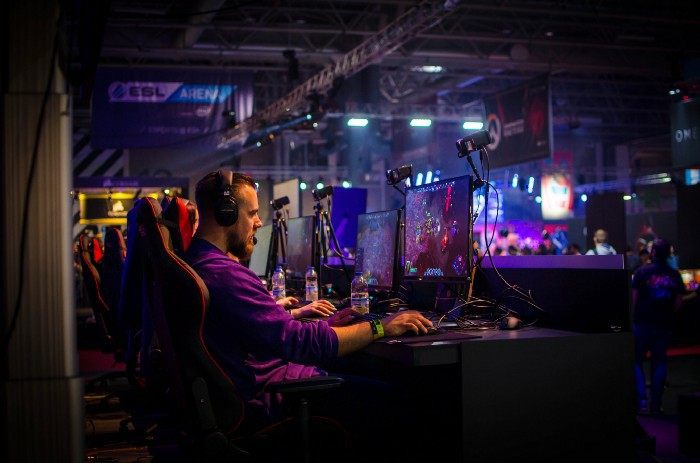
Most likely, you have heard of Bitcoin and the technology behind it; blockchain. It’s makings its’ way from the ‘tech-savvy’ blogs and news websites to the mainstream media. Since people know that it’s possible to make good money trading cryptocurrencies, everyone is all over it. Believe it or not, even some fashion & lifestyle blogs in the Netherlands have started writing about it.
Original purpose blockchain
After the financial crisis that rocked the world in 2008, Satoshi Nakamoto released ‘Bitcoin: a Peer to Peer Electronic Cash System’. In this paper, he introduced the concept of Bitcoin and briefly explained how it would operate. While Bitcoin focused on becoming a digital currency using distributed databases, the underlying technology called ‘blockchain’ has since developed itself into a ‘groundbreaking’ technology that has the power to disrupt any industry.
‘Blockchain is a digital ledger that is used to record economic transactions. Blocks are records of new transactions (data, financial transactions or locations for example). Once a block has been completed it will be added to the chain, creating a chain of blocks. These blocks are time-stamped and linked to the previous blocks, forming an unchangeable transcript. Once new data is added, there’s no way to erase it.’
Many experts say that blockchain will change the world we live in. This technology can, for example, give billions of people around the world access to financial services. One of the most significant obstacles for banks when trying to serve the unbanked is that many of them do not have identifying information, making it hard to use ‘Know your Customer’ practices.
Blockchain can power a shared ledger where individuals receive a digital identity for use in their banking. As a result, banks reduce the effort and their costs of onboarding new customers, allowing low-income individuals to save and lend money.
I’m keen to find out whether or not this technology will similarly change the world of esports.
The Millenials’ industry
Just like Bitcoin and blockchain, esports is booming. Growth rates of more than 25 percent a year are quite standard, and it’s on its way to becoming a 1.65 billion dollar industry by 2021. Moreover, other established industries such as media and entertainment are aiming at success in the industry as they have the opportunity to get to an audience that’s been getting out of their reach for a while.
According to Google, millennials watch nearly 50 percent less TV than adults older than 35. This group consumes content digitally through platforms like YouTube and Twitch, making them harder to reach for the traditional media companies. In contrast to the lack of presence of this group for traditional media companies, the esports community is driven by these people; over 75 percent of the total esports audience is within the age of 10–35.
Major shift in gaming
Over the last few years, the gaming industry has changed immensely. It all started with the launch of the (Apple) App Store some years ago. With the launch of this new platform came an entirely new industry of free-to-play games that were focused on making you pay for additional in-game items. These items would, for example, give your character another appearance, or boost the in-game performance by gaining extra lives.
In contrast to the old generation of games, where you had to pay $60 for a game, the new generation of games is mainly free-to-play. Take League of Legends, the current #1 profitable free-to-play game for example. League of Legends’ developer RIOT Games generated over 2.1 billion dollars in 2017 with League of Legends alone, just by selling in-game items. Champion skins, ward skins, profile images and other emotes are all solely cosmetic and can be purchased through the game’s in-client store.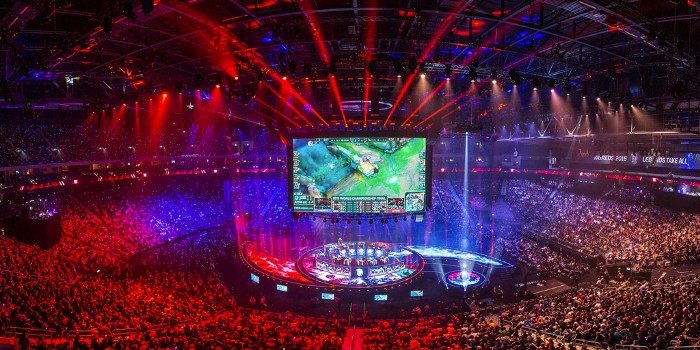
Free-to-play games targeted an entirely new audience and gave playing games room to grow among the ‘casual’ audience. Kids that had no money to buy games suddenly had the chance to play games with their friends and compete against other players. Gaming was making its’ way into the mainstream.
The broader acceptance of gaming within every generation has catapulted esports to fame. Whereas gaming was first seen as a waste-of-time and just for the ‘nerds’, this all changed with the arrival and growth of the free-to-play concept. Currently, some of the biggest esports such as League of Legends, DOTA2 and Hearthstone and some of the most recent upcoming esports like Fortnite, are all free-to-play.
Combining Crypto & Esports
According to many cryptocurrency & esports enthusiasts, esports is on the edge of a new significant change, namely the implementation of blockchain technology. In the last year or so we’ve seen dozens of attempts to exploit the growing world of esports with blockchain. There are a few main areas the many initiatives focus on:
Betting
15+ million unique daily visitors, 2+ million unique monthly broadcasters and a total of 355 billion minutes watched; Twitch has had its’ best year so far and is making esports accessible. Watch esports anytime, anywhere. The accessibility allows the esports community to grow, which results in subsequent growth in the esports betting scene. In 2016, esports enthusiasts have wagered approximately 649 million dollars on cash gambling websites. This amount is projected to be over 11 billion dollars in 2020.
Cash gambling is small compared to the size of skin gambling. However, it is estimated to close the gap at least a little bit. Looking at the amount wagered, over 92 percent of the total is generated by betting on esports matches, an activity that can be compared to betting on traditional sports games. 33 million dollars (5,1%) and 18 million dollars (2,8%) is generated through head-to-head betting and fantasy esports.
What companies have entered the blockchain esports betting area?
As the esports market and its’ audience are proliferating, it’s not more than usual that the amount of companies founded to benefit from the growth is enormous. In just a matter of years, there is now a mix of companies active on the esports betting market. On the one side, Pinnacle, BET365, Betway, and Ladbrokes represent the established traditional sportsbooks that have moved into esports, and on the other hand, Unikrn, GGbet, Skrilla, Firstblood, and Ultraplay represent the esports-only sportsbooks.
What’s the difference between those platforms?
As mentioned before, esports enthusiasts have wagered over 650 million dollars on the three main categories: esports match betting, fantasy esports, and head-to-head wagering. Each website focuses on one or two of these categories. Let’s give a quick explanation of these markets:
Esports matches betting
Esports match betting is the most significant category and the one that the traditional sportsbooks are involved in. This is the betting that probably everybody has heard of and is familiar with. The player bets on the outcome of, for example, a football or tennis match; win-lose, and in some cases, draw.
In esports, this is the area that has the mix of both traditional sportsbooks and recently founded companies leveraging blockchain, such as Unikrn and Herosphere. The big difference between those two clashing groups is the usage of the blockchain.
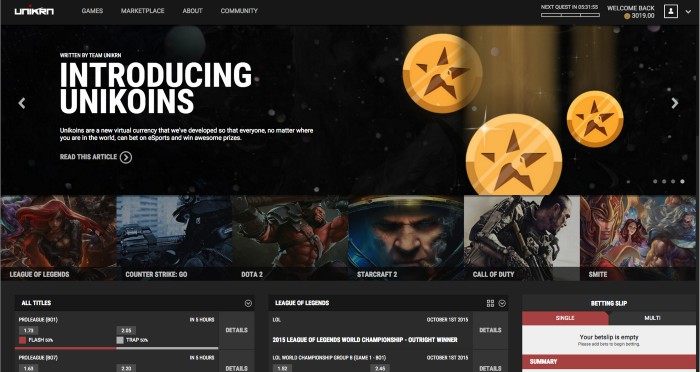
How and why use blockchain?
It’s probably a good idea to let Rahul Sood (Unikrn CEO) explain this, as he recently published perhaps the best answer to this question:
‘We’re in a highly regulated industry. Blockchain, if applied properly — you have things like transparency and trust. You can put things on the blockchain that are traceable and accountable. The cool thing about it is that for transparency, there’s really no better technology out there.
‘We started to think about how we could build our entire commerce platform on blockchain, where everything is transparent and open. At the same time, things like AML, anti-money laundering, and KYC, know your customer, can be put on the blockchain. That’s what we did. We built our entire platform on the blockchain. It has global KYC. It has individual verification. It has AML systems built-in.’
‘On top of that, we built a wallet, Unikrn Wallet, which allows people to accept Unikoins just like Paypal would. It’s on a private blockchain. That way, we can support tens of thousands of transactions without any sort of traffic or other issues. If the blockchain is backed up, transaction tend to take a long time. With our platform, they happen instantly with no transaction fees.’
‘We’ve turned Unikoin into two tokens. One of them is Unikoin Silver, which continues to be our free token that can’t be transferred or sold, but can be used with everything we do, and then the other is Unikoin Gold, which is a crypto token which can be purchased on major exchanges and also used on our platform.’
Fantasy betting
Fantasy betting is a little different from traditional betting as you don’t directly bet on the outcome of an event. Instead, you draft a ‘fantasy’ team consisting of players whom you believe will accumulate most points in regular matches. It’s not all about selecting the best players as you do have a specific budget and some players are more expensive than others.
The best example of esports fantasy betting right now is probably Skrilla. This blockchain initiative has created a platform that gives esports fans a new experience in viewing and engaging with esports matches. Through social competition, people can compete against other fans to win cash.
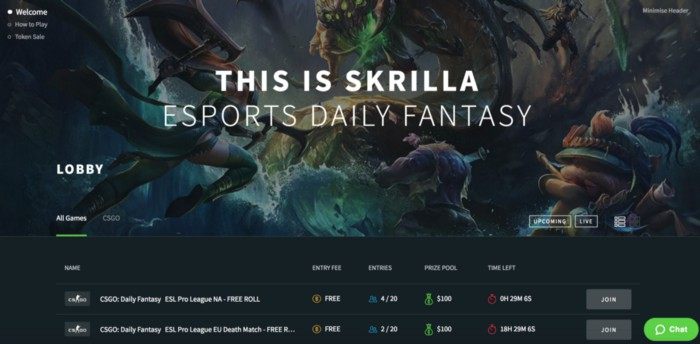
Just like you see in fantasy football, players pay an entry fee to participate in daily tournaments that have their focus on the biggest competitions in esports. Participants then have to pick their fantasy team from professional players in that tournament. Based on a professional player’s recent performances, each player has a particular price. It’s all about picking the right players to maximize the points earned!
How and why use blockchain?
By utilizing blockchain at the heart of their ecosystem, Skrilla will create a transparent architecture to provide an immutable ledger of all the transactions. This eliminates the need for corporate bookmakers making their betting lines and profiting from doing so, as the blockchain will take care of this process.
Skrilla will use its token, $SKR, to support all transactions done on the platform. At the start, it will be used in cooperation with the traditional currencies to make sure that the integration will be smooth. Once all the new transactions have been converted to the blockchain, $SKR will become the sole unit of exchange in the system.
Besides using it on their platform, Skrilla aims to integrate the token into the GAMURS Group’s (the company that founded Skrilla) ecosystem. Members would be able to purchase premium content to improve their gameplay, as well as other premium services that need to be paid for.
As stated by the Skrilla team, the implementation of blockchain into the Skrilla’s ecosystem will have some benefits for the community:
- Reduced fees: Skrilla removes the middleman and therefore reduces the costs.
- Improved trust: The decentralized blockchain records all transactions openly and cannot be changed.
- Incentivised participation: Members will be rewarded with SKR tokens for certain behaviors including account verifications, deposits, referrals, sharing content, following social account, entries into paid contests.
- Liquidity through global player pools: Current betting pools are regionalized due to currency exchange limitations. Creating one global unit of exchange will facilitate use and increase liquidity.
Head-to-head wagering
Betting is not all about the professional gamers. Many people play on an amateur level, but want to compete for money. Either by playing a 1v1/team vs. team duel or by entering a tournament, it’s their goal to prove that they are the superior player or team.
EloPlay noticed this and decided to hop on the trend. Initially created as a platform for one-on-one esports tournaments, they’ve decided to focus on building a platform that also supports team-vs-team tournaments. In the past one and a half year, the site has welcomed 90,000 registered users and has seen over 80,000 finished battles.
How and why use blockchain?
‘Blockchain technologies can bring full automation and transparency to the entire ecosystem of our platform.’
As blockchain does not include a central entity that decides how the system should work, the technology is, in fact, a self-sustaining system that guarantees immutability of any record stored therein. In the case of EloPlay, blockchain can promote decentralized prize pools, a system for game results accounting, and can automatize the betting structure.
Let’s make up an example. If there are 100 teams of five people each, and every team pays 5 dollars to enter, there’s a prize pool of 500 dollars. That’s quite a lot for a player that has just started playing competitively. Theoretically, EloPlay’s platform could host these tournaments every day without needing people to control everything.
In case players are new to the platform and do not own tokens to pay for participation, they can earn them by competing in sponsored tournaments. These tournaments are organized by brands and companies who form the prize pool, making participation free for all players.
Forming and Providing Teams
League of Legends, one of the biggest esports titles for years, has over 250 million players. Of course, many players play the game casually, but there are only around a hundred teams that compete. There’s some imbalance, to say the least. Compared to football, the most popular traditional sport, there are 300 million players globally and approximately 300,000 clubs. ‘DreamTeam’ is all about taking on the challenge of ‘fixing’ this imbalance.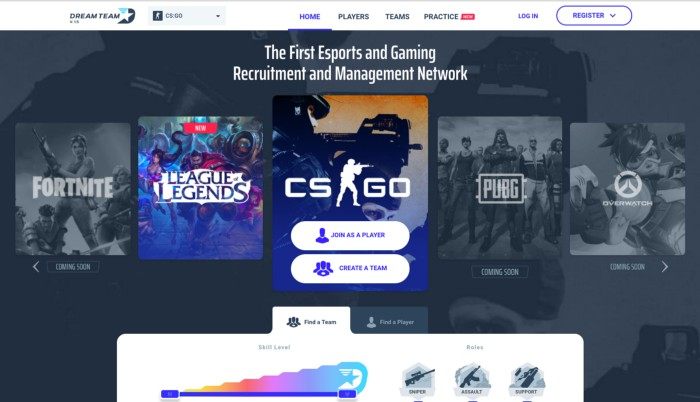
According to DreamTeam, one of the reasons for the disparity in the ratio of players to clubs in esports is the barrier to entry when it comes to building and managing a team. DreamTeam offers a package for gamers who want to grow, manage and monetize their squad. Using blockchain and smart contract technologies, DreamTeam created a recruitment and management platform for amateur, novice, and pro teams. The accessibility of esports is growing, making it more professional as well.
After having created a team, players and coaches can compete in tournaments and get paid salaries and bonuses using smart contracting. According to DreamTeam, blockchain technology and smart contracts will ensure the highest possible security, on-time payments, automated obligation control and an anti-fraud system.
What will actually influence the world of esports?
Let’s start with betting..
I do think that blockchain can improve the current way of match betting. As a regular gambler myself, I know what it feels like to wait an endless time before receiving my winnings. Even though some websites are trying to improve their performance, it’s still quite a problem. Smart contracting will enhance the speed, efficiency, and trust of placing bets and cashing out on them. Players are provided with the assurance of where their money is going and that their results were generated fairly. Once there is a reliable integration of blockchain, safe and high-speed betting will be available.
Another element that will help esports betting scale is the integration of global prize pools, something that is regionalized right now due to currency exchange limitations. The creation of one global unit of exchange will facilitate use and increase liquidity, making it more interesting for people to enter as the prize pools will be more significant.
Last but not least, as someone who played many wager matches on FIFA, I can confirm that smart contracting in 1v1’s or tournaments is crucial. I used to play quite some 1v1 cash games in FIFA a while back, but there were just too many disputes in who won the game. People that had lost the game ended up saying that they had won the game, something that would then be reviewed by an admin to determine the actual winner. After having played a 15-minute game of FIFA, it was often the case that disputed games could take up to 24 hours to confirm the winner. Smart contracting will resolve these issues as the winner will be automatically confirmed after a game. Instead of having to wait some time to get the winnings, they will automatically be assigned to the player who had won the game.
Managing teams on the blockchain
I think that, just like in esports betting, forming and providing teams on the blockchain will make esports more accessible but will not create a significant shift. It’s true that esports is missing a ‘hub’ that enables players to join the world of competitive gaming, but I’m not sure that just one platform can manage it all. It can help, but I reckon it won’t be enough to fulfill the needs of all esports players. As of now, Dreamteam has announced that it will support League of Legends, Counter Strike: Global Offensive, Players Unknown Battleground, Fortnite, DOTA 2 and Overwatch. Except for Fortnite, all of these games are played on PC only. Aiming to become the hub for upcoming esports talent, Dreamteam is excluding millions of console gamers all over the world. They will need to make the shift towards full integration of console gaming as well; otherwise, it will be hard for them to reach their goal.
Conclusion
If there is an industry that is made up of young, tech-savvy individuals, it’s esports. Gamers and the esports community as a whole tend to embrace new technologies quickly. Looking at this situation, esports should be one of the first industries to include blockchain in day-to-day usage.
But, like other technological revolutions, blockchain will take time to mature. It is still quite nascent, especially when it comes to the esports industry. All of the companies mentioned in this article have working products or platforms, but are still working on making blockchain become part of their ecosystem. As the journey towards blockchain becoming fully integrated into the ecosystem continues, it’s just a matter of time before people will eventually feel the difference with the old methods.








